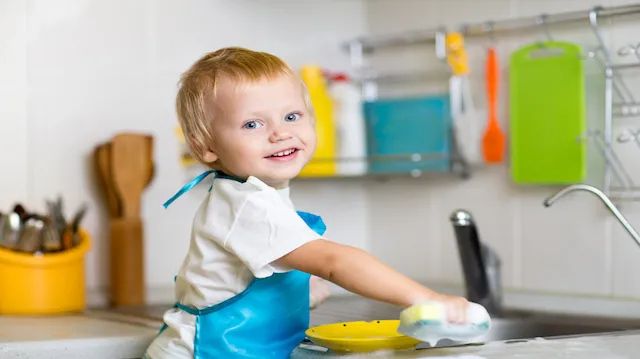As a parent of a preschool-aged child, I know how hard it can be to make kids do anything — especially a household chore. The simple request by a parent for a child to clean up their room is often met with whines, grumbles and bargaining. These reactions can be so exhausting that many a tired parent will choose to give up the fight.
However, even if you have to jump over a few hurdles, and suffer a few headaches, giving kids chores and reinforcing their completion on a regular basis is worth the effort.
Implementing a new routine can be a challenge and a half. In the case of my child, there are often many complaints about how he can’t do something, why he won’t do it, and what else he needs to do instead when a new task is introduced. Each milestone is a bit of a battle, and I’m sure I’m not the only parent who feels this way.
However, once a new task becomes routine, he seems to actually enjoy it (okay, sometimes), and often announces his accomplishment triumphantly once it is complete. This sense of accomplishment is one of the great rewards of implementing chores.
Along with the sense of accomplishment that children feel once they learn to do something, having them complete chores on a regular basis helps them to feel like they are contributing to the household. They feel “grown-up,” and they are, by the very nature of doing new things and helping out, growing up.
By insisting that children do chores, we are nurturing them so that they can become responsible adults who can maintain order in their own lives.
Some people might argue that a child’s primary job is to be just that: a child. I wouldn’t disagree with this; playtime is crucial. However, if we don’t give children any responsibilities, and we continue doing things for them that they could be doing themselves, how are they going to learn? And will they expect someone to always clean up after them when they are adults?
We have all met people in our lives who do not take personal responsibility for their actions, or that always expect someone else to handle their problems. Some people are very quick to dole out blame to others when things go wrong, and seem to lack the personal motivation to learn from their mistakes, or to handle them on their own.
Now, everyone is different, and there are various reasons that individuals behave in these ways. However, teaching our children personal accountability and responsibility early on is one way to help them become self-sufficient, responsible adults. We as parents do the best we can while they are young, and we hope that they continue good habits into adulthood. The important thing is that we give them a basis of accountability.

Some parents like to give their children a reward for a job well done. There is nothing wrong with this, but be careful not to go overboard. Make sure they don’t expect a reward every time, or they will think that they are entitled to one. Instead, celebrate an accomplishment, especially if your child has just completed something that they’ve had a hard time achieving. Kids should learn that chores are done because everyone contributes to the family, not because a shiny toy is coming.
Chores should, of course, be age appropriate, and shouldn’t take so long that playtime is compromised. However, even a three-year-old can put away their own clothes and keep their room tidy. If we expect these things of our kids early on, they will grow up knowing that contributing to the family is the norm.
—Tanya Rakhmilevich
Tanya is a writer at The Alternative Daily with a passion for meditation, music, poetry, and overall creative and active living. She has a special interest in exploring traditional Eastern remedies and superfoods from around the globe, and enjoys spending time immersed in nature.
